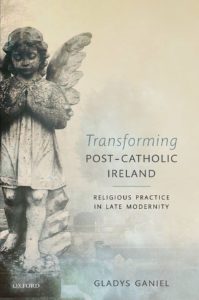
An interesting conversation between Dr Gladys Ganiel (Queens University, Belfast) author of “Transforming Post-Catholic Ireland: Religious Practice in Late Modernity” and Sean Moncrieff (Newstalk FM) on how people are adapting to the challenge of remaining Catholic in Post-Catholic Ireland today.
They begin by discussing what is meant by ‘Post-Catholic’ Ireland.
Listen to the interview here (12 minutes)

Gladys’s book and findings are welcome – but for me ‘post-clerical Catholicism’ would be a less confusing title for what she finds. If a distancing of oneself from the clerical institution is the pattern she discovers, why should this be described as ‘post-Catholic’, when Vatican II has been calling for half-a-century for ‘the emergence of the laity’?
That lay Catholics are wanting to talk to her about all of this is very refreshing to hear, however. It is surely the denial of dialogue to the laity by the clerical institution – from about 1968 – that has led to this development. It is not too late for this ‘apartheid’ to be ended from the clerical side, but it is very late indeed!
Sean asks, If a distancing of oneself from the clerical institution is the pattern she discovers, why should this be described as ‘post-Catholic’.
On further reading, it seems to me Gladys does mean post-catholic, perhaps beyond institutionalism.
That leaves a lot to think about.
“….. one of the most striking things I found was that people just couldn’t stop talking about Catholicism. ……. without even asking people about the Catholic Church, they started talking about it. Some interviews were like therapy sessions, as if people needed to process what it was like living as a Catholic on an island where the role and standing of the Catholic Church has changed so rapidly.”
The desire of Catholics wanting to talk about there experience is the most striking part of this article.
Maybe the reason for this has been the almost total lack of any official forum within Catholic Church structures for lay people to discuss or debate matters of church and faith. There have of course been a few welcome diocesan ‘listening exercises’ but they seem to be one-off and do they really influence decision making in any meaningful way? Canon law puts decision making solely in clerical hands. Pastoral Councils are interestingly never given the opportunity to come together at diocesan or national level to develop and offer a collective voice. Canon law does allow for synodality but this is never used (Limerick being a recent notable exception).
This neglect has prompted at least some of us to find our voice through Catholic reform groups which at least allow us to air our thoughts and views online. Unfortunately we struggle to get our voice heard or to be taken seriously. We face many obstacles. On the one hand there is conservatism and indifference (or at least a throwing of the eyes to heaven and a letting the institution get on with whatever it is they do). On the other hand there is the fact that there are many Catholics who may share our views, but have either lost hope that change can happen or else no longer wish to be identified with the institution and have abandoned church practice.
It would seem however that the need to converse on matters of church and faith remains strong and every opportunity to do so will still be taken up, be that with a passing research academic or over coffees or pints across Ireland any day of the week. Its just a shame ongoing dialogue cannot be facilitated within church structures and be understood as a vital, indispensable dimension of church procedure.
I totally agree with you, Martin Murray, that it is a shame church structures do not facilitate ongoing dialogue. ‘Post Catholic’ is good IF it leads to truer Christ followers caring more about the poor and the marginalised than in the upholding of structures, dogmas and rules; if it puts compassion first. Gladys says that there is a schism now between the institution and peoples’ beliefs – the beginning of thinking Catholicism perhaps. Gabriel Daly wisely points out in his book, ‘ The Church:Always In Need Of Reform’:
“Identifying the magisterium with the church… As long as this attitude is allowed to prevail, there can be little prospect of reform.”
More and more Catholics are following their consciences and ignoring church teaching in matters such as contraception and same sex issues. However we still have so much more work to do to persuade people to realise that they can empower themselves, that they must use their voices to speak out. Reform is still only supported by a few and we have an increasing number of ‘No Surrender’ Catholics who cannot take any criticism at all and overreact in a triumphalist manner. The “proud to be Catholic” types who are quite hard to stomach! We have seen it lately in the rush to defend Maynooth. It’s a sign of maturity to take constructive criticism on the chin and to learn from it so we need to be able to firstly accept and then learn from criticism. Where better than by ongoing dialogue?
“the beginning of thinking Catholicism” I like that!